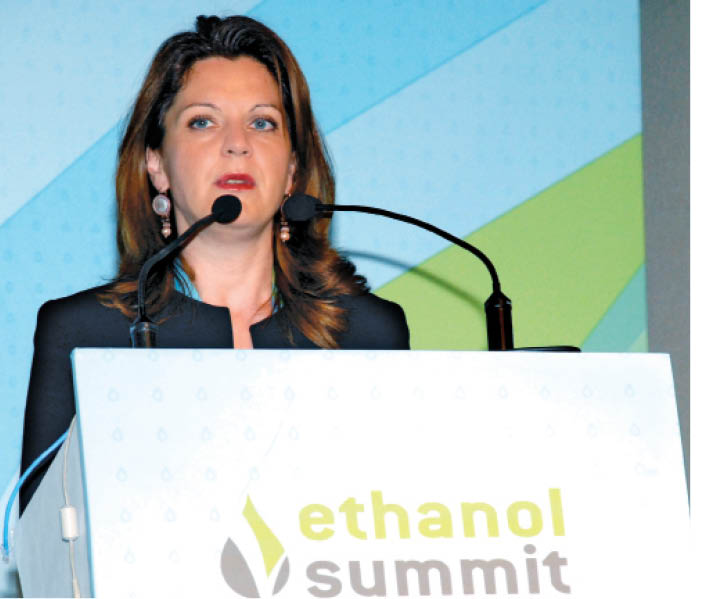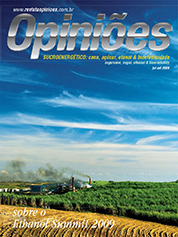Géraldine Kutas
Senior advisor to the president of the Brazilian Sugarcane Industry Association on International Affairs
Op-AA-21
Certified biofuel: how to get there
Various sectors involved in the production and use of biomass for energy, including public authorities and civil society, are now debating its sustainability. Several initiatives are being undertaken to create certification systems for biofuels, which take into consideration social, environmental and economic aspects involved in its production system, at different levels of specification: principles, criteria and indicators.
Certification is an important instrument to differentiate products, facilitate client and consumer purchasing decisions, in addition to being useful in legitimizing the image of the sectors involved. Its application, however, is still a major challenge.
National, international and multi-stakeholder fora, both voluntary and mandatory, can be mentioned as examples of efforts to develop standards aimed at guaranteeing biofuel production sustainability: these include the European Directive on the use of renewable energy (2008), the Round Table on Sustainable Biofuels (RSB), the Better Sugarcane Initiative (BSI) and the United Kingdom’s Renewable Transport Fuel Obligation (RTFO).
Voluntary certification systems can be established through processes involving several interested parties (multi-stakeholder process) or through bilateral business-to-business negotiations. In both cases, standards are agreed upon by the interested parties, as well as through a verification and monitoring system, which must be developed according to the intended objectives.
 In the case of mandatory certifications, these are incorporated to legislation and compliance becomes a pre-condition for market access. A major portion of both systems is in an initial phase or still being developed. Practical implications, as well as required structures and inherent costs are therefore still largely unknown. Among certifications in effect, one may mention the “Renewable Transport Fuel Obligation”, usually referred to as the RTFO.
In the case of mandatory certifications, these are incorporated to legislation and compliance becomes a pre-condition for market access. A major portion of both systems is in an initial phase or still being developed. Practical implications, as well as required structures and inherent costs are therefore still largely unknown. Among certifications in effect, one may mention the “Renewable Transport Fuel Obligation”, usually referred to as the RTFO.
Developed by the United Kingdom’s national transportation department and managed by the British Renewable Fuels Agency, RFA, the program aims at reducing carbon emissions in the transportation sector, currently responsible for almost 25% of the country’s emissions. To that end, it is mandatory that fuel importers and refiners with activities in the United Kingdom sell a certain percentage of biofuel.
It is intended that by 2010, these parties will be responsible for 5% of total national fuel sales, whereas the intermediary target currently in effect is 3.25% of the volume. Together with the mixing mandate, the program sets sustainability criteria (RTFO meta-standards) for biofuels, encompassing seven main themes: five environmental and two social.
It is up to the selling agents to voluntarily report the data relative to compliance with such criteria to the RFA, which must then assess and publish them. It should be noted that this data is as yet not audited, and agents are required to submit truthful information. The Directive on Renewable Energy Sources, approved in 2008 by the European Union, is another example of a mandatory initiative.
This norm obliges EU Member States to use, beginning in 2020, 20% of renewable energy in their energy matrix, of which 10% must be applied in the transportation sector. One expects that most of these 10% set as a target for the transportation segment will be attained through the use of biofuels. However, unlike the RTFO, the EU conditions such targets upon compliance with mandatory sustainability criteria.
This means that in order to be considered in the 10% target for the use of renewable energy by the transportation sector and receive fiscal incentives granted by certain European countries for the use of clean energy, all biofuels, irrespective of origin, must prove their conformity to sustainable production standards as defined by the Directive, which include aspects related to the reduction of greenhouse gas emissions, the prohibition of the use of land with high carbon inventories and a high conservation value, also applicable for forest and swamp areas.
In order to assure compliance with the criteria, the European Commission may celebrate bilateral and/or multilateral agreements, as well as accredit already existing certification systems - voluntary or otherwise, provided they are in conformity with the verification standards and procedures set forth by the Directive.
These must be accepted by all countries comprising the European Union, for the purpose of avoiding disproportionate administrative and financial costs, as well as promoting their compatibility with the rules of the World Trade Organization (WTO). The WTO will play a fundamental role for compliance with the Directive, in order to assure that no new non-tariff barriers are created for biofuels originating in other countries, such as, for example, Brazilian ethanol.
To ensure the Directive reaches its objectives, however, it will also be necessary to draw up definitions for the required criteria, as well as methods to identify them. The current absence of clear rules makes it difficult to match certification systems under development to compliance with European requirements. Among voluntary certification systems, it’s worth mentioning the international forum Better Sugarcane Initiative (BSI).
Its objective is to promote the sustainable production of sugarcane and its sub-products, by setting principles and measurable criteria, applicable internationally and developed according to a gradual and multi-stakeholder process. Actually, this initiative already congregates important investors, traders, producers, companies and non-governmental organizations (NGOs), and is currently carrying out consultations and pilot projects to subsequently finalize its criteria and indicators.
For instance, sugarcane certification by BSI may greatly facilitate the process of obtaining other approvals for biofuels, which should help to confirm compliance with the requirements set by the European Directive, while even serving as a potential alternative to the sustain-ability requirements, some of which have already been imposed by different buyers in their contracts with suppliers.
The current scenario, however, which is characterized by the multiplicity of certifications for different kinds of biofuels, is counterproductive and ends up discouraging investments. The possibility that many of these certifications may foster the implementation of trade barriers is a cause for concern, especially against developing countries such as Brazil – the world’s second largest producer and top exporter of ethanol, with more than five billion liters exported in 2008.
The development of a certification system must be transparent, gradual and non-discriminatory, so as to bring together the naturally distinct interests of all parties concerned. The inclusion of a multitude of agents is essential, all of which must be duly committed to the initiative, so that it may reflect credible sustainability criteria, be objectively measurable, subject to auditing and universally applicable. It is also indispensable that the required standards, as well as their verification methods, be scientifically fundamented.
Furthermore, compliance with the requirements for certification must warrant a premium on the product price, in order to positively foster its ongoing adequacy. Mechanisms that assure such benefits must be studied and applied. Another important aspect is that final criteria must focus on the main aspects of promoting sustainability, thereby avoiding unnecessary complexities or any subjective qualitative approach that might conceal possible protectionist intentions and value judgments.
It is also recommended the framework of existing experiences resulting from certification efforts already in place be taken into consideration, such as in the forestry segment, before implementing certification programs for biofuels. The sugar-energy sector understands that its involvement in certification programs is essential. Apart from being an increasingly more common consumer demand, certification constitutes an excellent commercial opportunity, to the extent that it posi-tively impacts access to markets and capital.
Therefore, some characteristics must necessarily be a feature of these systems, such as the inclusion of criteria that take into account the three pillars of sustainability (environmental, social and economic), the involvement of the entire production chain, with the corresponding allocation of costs as well as the adoption of broad-ranging instruments, to prevent a situation where only a few of the products available on the market obtain the label and, hence, improve their performance. Certification is meant to function in favor of a product, not against it.




